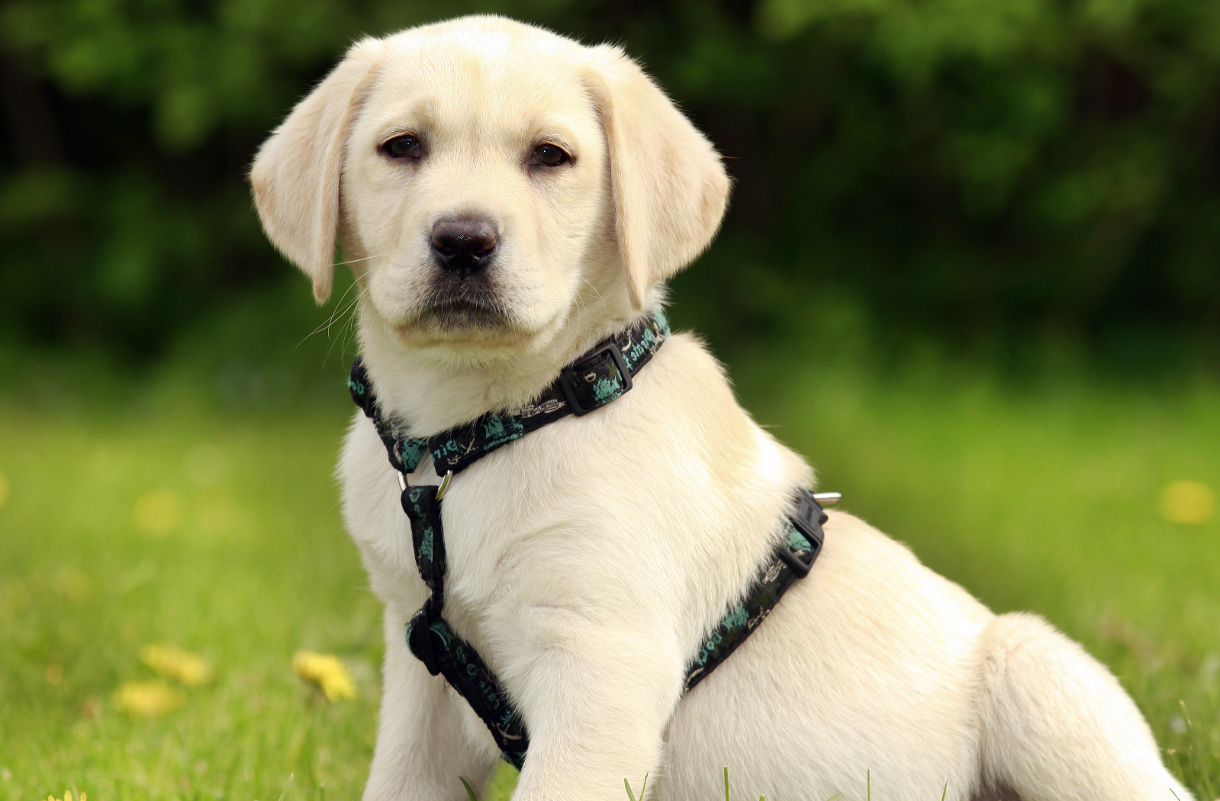How to take care of Labrador Puppies

- Maheshwari Giri
- 08 March, 2023

Labrador puppies are a ball of fun. They are playful, cute, and always enjoy the company of children and adults.
Labradors are not demanding dogs. They make ideal pets that are are amazing companion dogs that are always ready to follow their owner everywhere.

If you are bringing a labrador puppy home this article is for you. We’ll be firstly taking a look at the origin of the labrador breed (where they come from) and also look at their personal needs for them to grow healthy and strong.
The labrador breed of dog is originally from Newfoundland. They were later bred in the UK as hunting gun dogs. They are bred for their ability to retrieve, their friendly nature, and their ability to dominate field trials.
A fully grown labrador is a large dog that lives for 12 to 13 years. Labradors are heavy dogs and weigh 80 pounds when fully grown. Female labradors weigh about 20 kilos less. Labradors come in three main colors I.e Golden (yellow), Chocolate, and black. Labradors have thick tails that are flat at the base and tapering at the edge. Labradors have a short dense coat.

In this article, we will prepare you for when you bring a labrador puppy home. Let’s look at the specific needs of labrador puppies for sale in Chennai.
Labradors have a varying diet depending on the age of the puppy.
Dogs of 0-45 days survive only on milk and this potion is either offered by the dog’s mother or you will have to feed the dog yourself using a milk bottle of roughly 100 ml twice to thrice a day.
At 2 to 6 months Labrador puppies are able to eat started dry food. Choose a brand of puppy food that is rich in the nutrition that puppies need.

At 6-15 months your dog will start to eat like an adult. It’s time to give your dog solid food that is available from pet stores. You can also feed your dog thin strips of raw red meat or cooked chicken (boneless) with veggies.
There are a number of types of healthy dog food that you can feed your dog other than kibble. These foods can be meats, veg, and cooked food. Let’s take a look at some of these foods that you can feed your dog.
Raw food can be a risky proposition when feeding your dogs. Raw foods may contain bacteria that are a health risk to both humans and your puppy. An unbalanced diet of raw food can affect the health of your dog. It is for this reason that vets recommend kibble or feeding your dog cooked meats like chicken.

The correct food for your puppy should take up all its nutritional needs and ensure the health of your pet. Look out for good quality food that has the nutritional benefits for your dog printed on it. Look for dog food that has a nutritional protein value of 90% and above. Such food should also contain proteins and minerals. Buy food that is healthy and balanced for your puppy’s health.
The crate is the home for your puppy in the first few months of its life. Your puppy plays and grows older in its crate. Feeding your puppy in its crate increases its attachment to its living space. When feeding your puppy in its crate ensure that you have put the food all the way to the back of the crate. Remove any obstructions from the crate like toys and blankets that may get dirty by spills from your puppy’s bowl.
![Free download Labrador Wallpapers Wallpaper 16001200 Lab Puppies Cute White [1600x900] for your Desktop, Mobile & Tablet | Explore 64+ Wallpapers of Dogs | Dog Wallpaper for Walls, Funny Wallpapers of Dogs, Dog Wallpaper 1920X1080](https://img.wallpapersafari.com/desktop/1440/900/21/23/lpwoQ9.jpg)
Choose a food and water bowl for your puppy that is heavy and does not move around. Ensure that your puppy has separate bowls for food and water. Plastic bowls are an inexpensive option for your puppy bowl. You can also use ceramic bowls that are heavy (so they don’t move around much) and are easy to clean. Stainless steel bowls are also good as they do not break and are easy to rinse.
Labrador puppies love to eat and for this reason, may become overweight quite easily. Ensure that you feed your puppy only twice a day with nutritious meals that are rich in all the various nutrients. Do not overfeed your puppy. A puppy needs only 150 grams of food per sitting. Do not feed your puppy if it is asking for food between meals. Labrador puppies are known to be voracious eaters.

Labrador puppies do not need a bath very often as they may fall sick. It is ideal to wash your puppy only once every 2 months. Use a mild dog shampoo when washing your puppy. So not use human shampoo as this may dry the skin of your puppy. A puppy has natural oils in its coat and this gets washed away when you shampoo your puppy. So, be aware of the specific bathing needs of your puppy.
A puppy needs a clean place to live and eat. It protects its health and lets it grow up to be a big and strong dog. Wash the puppy’s bedding in the washing machine with a mild detergent or. When cleaning your puppy’s crate use a brush and mild detergent to scrub the home of your puppy. It is advised to completely rinse your puppy’s crate after washing to ensure that there is no detergent left behind.

Labradors are jolly dogs that often wag their tail and like to be happy. You’ll notice that your labrador puppy is extremely playful and gets along well with adults and kids. In order to keep your labrador dog happy ensure that it gets a lot of fresh air and exercise.
Take your dog out for a walk once a day for at least an hour. You can play fetch with your puppy or have it follow you around. You can also teach your dog how to respond to its name and come when called.
Buy your pet fun toys to play with when at home or outside. Labrador puppies love toys that they can play with.
Praise your puppy often and give it a lot of love and attention. Take your puppy for walks and carry puppy snacks with you for when your puppy does a good deed. Remember, lots of love creates a happy labrador.
It is extremely important to vaccinate your puppy after bringing her home from the pet store. There are a number of illnesses that may affect your dog if you do not vaccinate it on time. Let’s take a look at some of the Dog Vaccination Schedule that your dog will need when it’s a puppy.
The vaccinations that your dog will need to prepare its health are as follows:
As mentioned earlier, Labrador puppies love to eat and may get overweight because of this habit. It’s recommended to check your puppy’s weight twice a month. The ideal weight for a labrador puppy at 3 months is 25 lbs and at 6 months that weight will be 50 Lbs. On average a Labrador puppy will gain two pounds of each week of weight.
If your puppy is picking up weight to fast try and cut down its below meals snack and ensure that you are feeding your dog the ideal amount of food.
A puppy that has daily exercise is a happy puppy. Your puppy should exercise at least once a day with a walk that is nearly an hour long. Walking and swimming are two examples of exercises that are easy on your dog’s joints. Having not enough exercise may cause your dog health issues like joint problems, weight gain, and other health issues. Exercising your dog not just keeps it healthy but also helps you develop a bond with your pet.
Owing to the size of the labrador breed training your dog later in life can be daunting as they are large and excitable dogs. Instead start training your dog at an early age. You can start training your dog from 6 to 12 weeks old. Training sessions should be fun. You can start toilet training your dog at this age. You can also start with simple commands such as getting your dog to follow when you call it and teaching your dogs commands such as sit and fetch. Reward behavior that you want to encourage in your dog.
No matter how much you take care of your dog it may get parasites like fleas, ticks, and tapeworms. If this is the case you should give your dog a bath using medicated shampoos to care for your dog. You can also give your dog a deworming pill to get rid of any internal parasites. Check your dog’s fur and skin for any parasites regularly. Also, check the inside of your dog’s ears for ear mites.
In the first few weeks of bringing your dog home, you’ll need to visit the vet often according to your puppy’s vaccination requirements/ Your dog needs regular visits to the vet in order to get its vaccinations and for you to care for its health. Visit a vet at least once every two months. If there is something wrong with the health of your dog, don’t wait. Take him or her to the vet immediately so that it may get the proper medical care it needs.